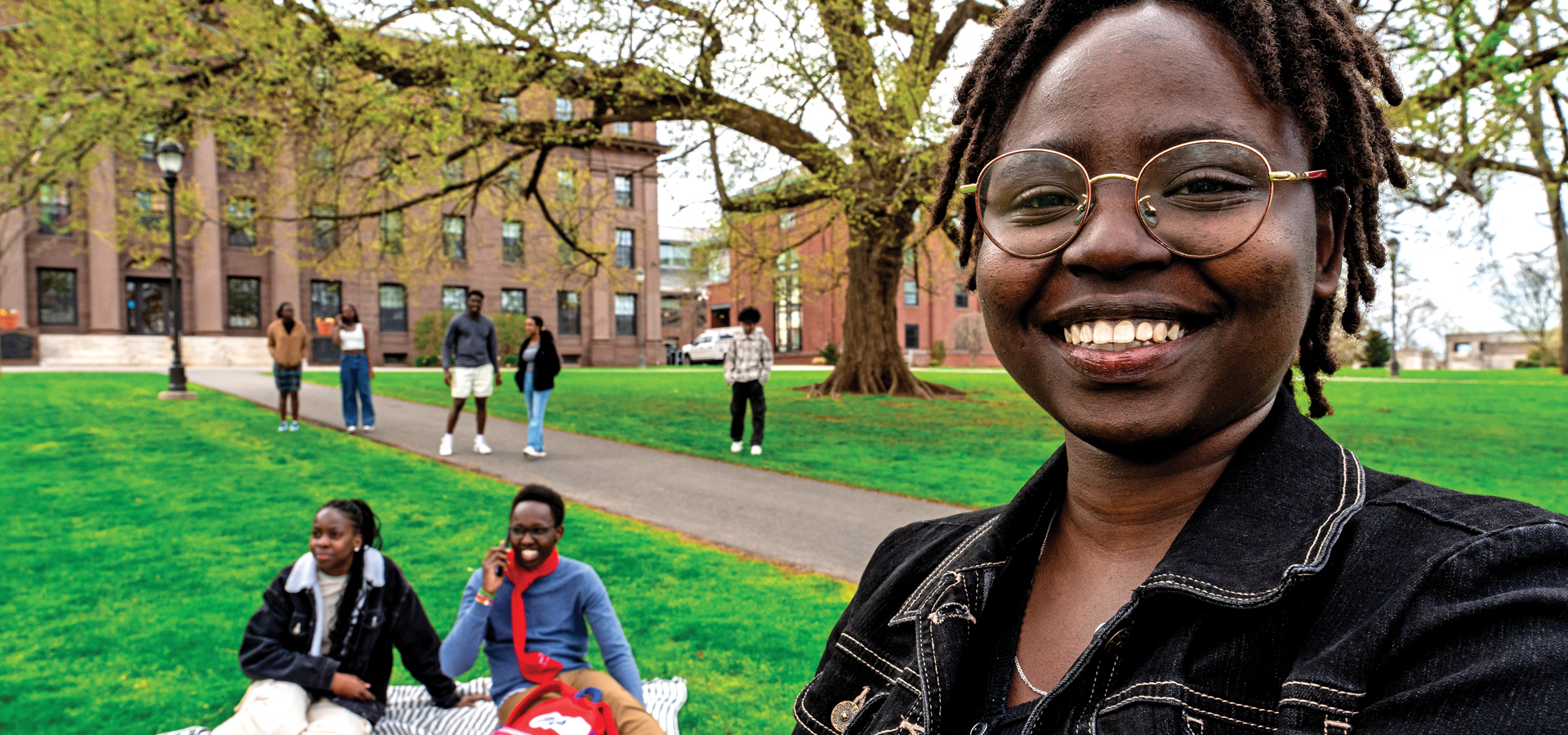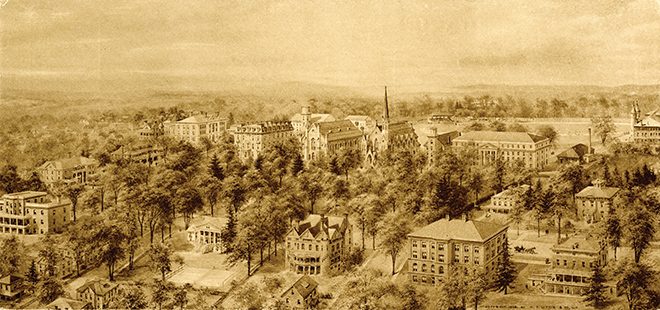Global Cohort Promotes Cultural Connection

Twenty-five years ago, 16-year-old Souleymane Ba ’03 left his home in Senegal, came to the United States, and, eventually, received a scholarship to attend Wesleyan. He participated in WoW (Wesleyan Orientation in the Wilderness) hiking groups with other first-years, took classes in Mandarin, and joined the rugby team and sailing clubs—“the sort of activities I didn’t have at home,” he said. In Butterfield A, Ba met one of his best friends, Claudio Alvarez ’03, and spent Christmas at his family’s home; to this day, Alvarez’s mother visits him.
What Ba found at Wes was a culture of curiosity where he could expand his realm of experience and where the exchange of ideas and perspectives was a crucial part of learning. “People are very curious,” said Ba. “I felt Wes was a place where you could be yourself and not be judged.”
Now Ba, whose passion for economics became a career as a private equity investor with a focus on climate and sustainable energy in emerging markets, has a piece of advice: Invest in Africa. By 2050, one in four people on the planet will be African, and one-third of college-aged people will come from Africa as the population on the continent nearly doubles in the next 25 years. Aside from the continent’s growing, global influence, Ba knows firsthand the mutually beneficial prospects of what can happen when students from different backgrounds interact and learn from each other. And as a former trustee, he sees the potential for the University to continue to lead in new areas for growth. “Wesleyan has a chance to be an early mover, to create a Wesleyan brand and presence in Africa before it’s crowded,” Ba said during a presentation to the Board of Trustees in February 2020.
In May 2023, Wesleyan University announced the launch of the African Scholars Program, a four-year scholarship for exceptional students from 54 different countries across Africa. The inaugural cohort of 13 African Scholars began their academic year at Wesleyan in the fall of 2023. But even before the program launched, students from Africa were finding entrepreneurial success and contributing to the culture of curiosity and care at Wesleyan. Kennedy Odede ’12 has been internationally lauded for his grassroots SHOFCO organization, and many recent African alumni have been awarded grants to develop businesses, nonprofits, and other initiatives that address education, health care, agriculture, and technology challenges within their communities.
Eugene Gato Nsengamungu ’23, MA ’24 received a Davis Project for Peace grant from the Patricelli Center for Social Entrepreneurship to found the Rwanda Youth Tech Informants (YTI) project, a program that teaches basic digital literacy skills to high school students in rural areas of his home country, Rwanda. These skills empower students to access online services provided by the government—everything from job search databases to driver’s license applications and tax help. Nsengamungu, who didn’t see his first computer until age 19, recognized that without help, Rwandans would fall behind in today’s digital-first world. In its first year, YTI has already served 430 residents with technology training, data consulting, and facilitating research.
When he read about Nsengamungu’s work, African Scholar Gad Nkurunziza ’27—also from Rwanda—was inspired to apply to Wesleyan. “Eugene showed me that Rwandans are able to make a difference and use Wesleyan’s resources to come back to Rwanda and impact the broader Rwandan community.”
This past spring, Nkurunziza was awarded his own Davis Project for Peace grant for the Youth AgriChange Network (YAN) project, a program that will introduce poultry farming as a route to economic and social mobility in Rwanda. Nkurunziza received a chicken when he was in the sixth grade, and the subsequent egg supply provided his family with a consistent source of protein as well as income for necessary materials, like shoes and books for school. The first phase of the YAN program will identify promising secondary students in the Burera district of Rwanda who will receive training and education from veterinarians on how to sustain proper poultry cultivation. The second phase will provide every family with a chicken to promote health benefits and economic stability. “The goal is to make a change, a shift from poverty . . . and to mitigate malnutrition among young kids,” Nkurunziza said.
In addition to scholarship monies, African Scholars receive support from the Office of International Student Affairs (OISA), the Fries Center for Global Studies, and the Resource Center to address their unique socioeconomic, cultural, and academic needs. A key component of the program is Wesleyan Africans Thriving Together (WATT), an OISA initiative created for the inaugural group of African Scholars that matches current student mentors with incoming Scholars.
Holiness Igiraneza ’27, an African Scholar from Burundi, came to Wesleyan seeking to investigate epigenetics, an issue close to her heart: “My brother was born with complex congenital heart defects,” she explained. “That’s why I have always wanted to learn more about what happens on the molecular basis that triggers gene expression.” When she arrived on campus, she was most anxious about securing a research position that would allow her to pursue this line of inquiry.
Her WATT mentor, Fatoumata Gaye ’24, is from Senegal and helped Igiraneza navigate the first weeks of the semester, including how to research professors and when to apply for lab positions. WATT also planned intercultural and community-building events for the cohort throughout the academic year, including the welcome dinner in early September; meet-and-greet dinner socials with Wesleyan faculty, staff, and members of the International Student Advisory Board (ISAB); an intimate conversation with Wesleyan Distinguished Writer in Residence Chigozie Obioma of Nigeria; and a trip to New York City over spring break.
Igiraneza found a research position in Professor Scott Holmes’s lab where she shadows Lucas Hughes ’24. She’s not doing independent research yet, but the experience she gained this year will further her studies in genetics and set her on a path to med school. Outside the lab, Igiraneza also pursued her passion for contemporary and African dance and joined the International Student Advisory Board to advocate for students like her.
Providing access to a Wesleyan education through the African Scholars program is only the first step to equipping students with the skill set to be competitive in an African-dominated global market. As Wesleyan continues to prepare students for a future that takes into account the value of cultural understanding in a global economy, the next step requires reimagining how the University provides all students—domestic and international—with educational opportunities to study Africa, whether that’s through study abroad programs or interdisciplinary courses offered outside of the African Studies department. The end result is an opportunity for all students to develop what Ba calls the “African edge”—a global perspective that will be advantageous in whatever profession or industry they pursue after graduation.


